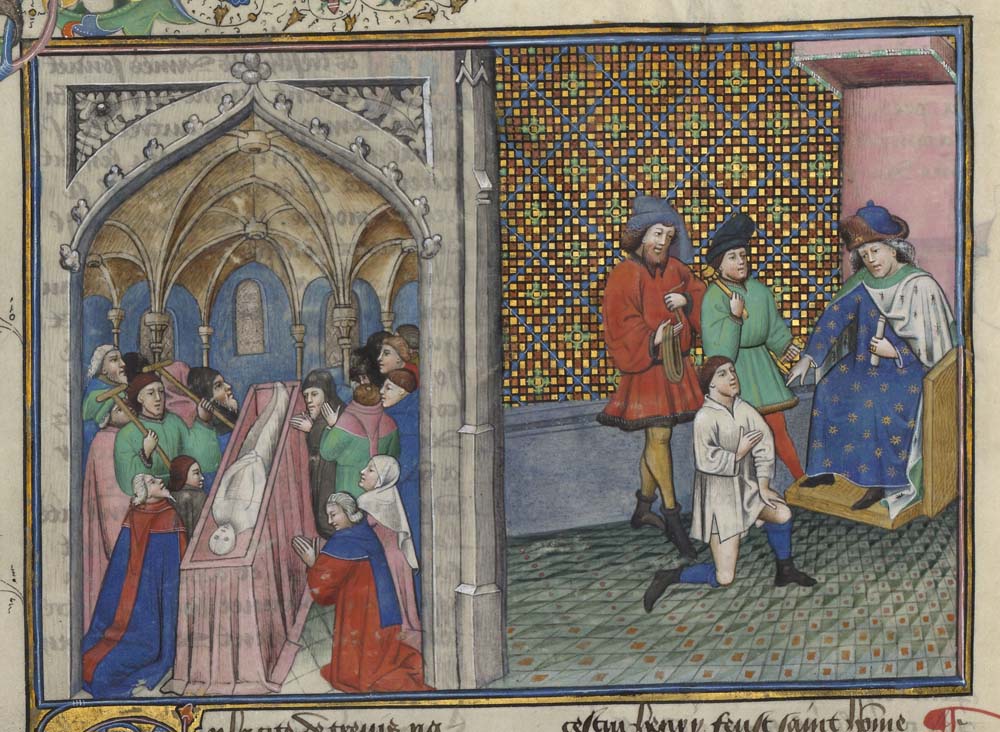
Miniature from The Decameron by Master Jean Mansel (1430-1450) and copyist Guillebert de Mets, Parigi, Bibliothèque de l’Arsenal, 5070.
Throughout The Decameron by Giovanni Boccaccio, I noticed several recurring themes, but in particular, the topic of disguises caught my attention. Characters in the story often took part in changing their identity in order to experiment or get things that they longed for.
One example of this in the male perspective is Day 3, Story 2. In this story, recounted by Pampinea, King Agilulf finds out that the groom impersonates him in order to fall in love with his wife, and she knew nothing of this. Because of this, the King goes on a mission to uncover who the man is, but the groom cleverly gets away with it for some time. However, the King learns of the groom’s scheme. On line 24 of Day 3, Story 2, Pampinea states, “So, angered and incensed beyond measure by the trick which, he saw, had been played upon him, he resumed his mantle and quitted the room with the intention of privily detecting the offender, deeming that he must belong to the palace, and that, whoever he might be, he could not have quitted it. [ 024 ].” The King then warns the townspeople of the groom’s trick in order to save his and his wife’s reputation.
An example of this in the female perspective is Day 2, Story 9. In this story, narrated by Filomena, a merchant name Bernabò places a bet with Ambroguiolo on his wife’s loyalty to their relationship. Ambroguiolo wins and Bernabò seeks revenge on Zinevra, his wife, for committing adultery by demanding a servant to kill her, though Ambroguiolo was in fact deceiving him. As a result, she dresses as a man in order to convince the servant to not do so and to lie to Bernabò. She later finds out that Ambroguiolo was the one who made this lie against her and bring him and her husband to the sultan. She pleads for forgiveness from her husband and Ambroguiolo is murdered for lying. Filomena (Day 2, Story 9) states, “…Sicurano, weeping, threw herself on her knees at his feet, and discarding the tones, as she would fain have divested herself of the outward semblance, of a man, said: [068]. ‘ My lord, that forlorn, hapless Zinevra am I, falsely and foully slandered by this traitor Ambrogiuolo, and by my cruel and unjust husband delivered over to his servant to slaughter and cast out as a prey to the wolves; for which cause I have now for six years been a wanderer on the face of the earth in the guise of a man.’ [069].”
Overall, these two stories are similar in the sense that the two individuals were successful in using the power of disguise in order to get something that they need/want. Nevertheless, it is clear what role men and women each play in society. In this instance, Zinerva had to disguise herself as a man in order to save herself from being murdered, while the groom disguised himself as another man for his own sexual pleasure. The Decameron web states, “When a male dresses as a female, he is ‘lowering’ his status; when a female dresses as a male, she is ‘raising’ hers.” (Decameron Web | Themes & Motifs, n.d.). Clearly, being a woman during this time was looked down upon and were submissive to men, and Boccacio may or may not have agreed with this. He wrote several stories showing women having to disguise themselves as males in order to “save themselves” from doing something that they did not want to do. Evidently, he understood the hardships that women faced, but it’s difficult to state his overall position.
Citations:
- Donaggio, Monica. “Il Travestimento nel Decameron.” Studi sul Decameron. Firenze: Le Lettere, 1988.
- Decameron Web | Texts. (n.d.). The Decameron: Day 3, Story 2. https://www.brown.edu/Departments/Italian_Studies/dweb/texts/DecShowText.php?lang=eng&myID=nov0302&expand=day03
- Decameron Web | Texts. (n.d.-b). The Decameron: Day 2, Story 9. https://www.brown.edu/Departments/Italian_Studies/dweb/texts/DecShowText.php?lang=eng&myID=nov0209&expand=day02



Excellent introduction, but I expected to read about the stories we read for this class, which have a lot of disguises.
What stories are represented in the pictures?